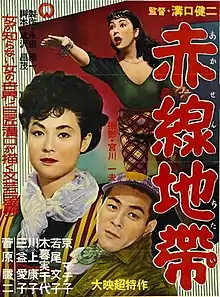Street of Shame
Street of Shame (赤線地帯, Akasen Chitai, "Red-light District") is a 1956 black-and-white Japanese film directed by Kenji Mizoguchi. It is the personal tales of several Japanese women of different backgrounds who work together in a brothel. It was Mizoguchi's last film.
| Street of Shame | |
|---|---|
 Theatrical release poster | |
| Directed by | Kenji Mizoguchi Yasuzo Masumura (assistant director) |
| Produced by | Masaichi Nagata (producer) |
| Written by | Masashige Narusawa (writer) Yoshiko Shibaki (novel) |
| Music by | Toshiro Mayuzumi |
| Cinematography | Kazuo Miyagawa |
| Edited by | Kanji Sugawara |
Production company | |
Release date | March 18, 1956 |
Running time | 87 minutes |
| Country | Japan |
| Language | Japanese |
The film is based on the novel Susaki no Onna by Yoshiko Shibaki. In July 2018, it was selected to be screened in the Venice Classics section at the 75th Venice International Film Festival.[1]
Plot
Five female sex workers are employed at Dreamland, a licensed brothel near the Sensōji Temple in Tokyo's Yoshiwara district. As the Diet considers a ban on prostitution, the women's daily dramas play out. Each has dreams and motivations. Hanae is married, her husband unemployed; they have a young child. Yumeko, a widow, uses her earnings to raise and support her son, who is now old enough to work and care for her. The aging Yorie has a man who wants to marry her. Yasumi saves money diligently to pay her debt and get out; she also has a suitor who wants to marry her, but she has other plans for him. Miki seems the most nonchalant, until her father comes from Kobe to bring her news of her family and ask her to come home.
Cast
- Machiko Kyō as Miki
- Ayako Wakao as Yasumi
- Aiko Mimasu as Yumeko
- Michiyo Kogure as Hanae
- Kumeko Urabe as Otane
- Yasuko Kawakami as Shizuko
- Hiroko Machida as Yorie
- Eitarō Shindō as Kurazō Taya
- Sadako Sawamura as Tatsuko Taya
- Toranosuke Ogawa as Mickey's father
- Bontarō Miyake as nightwatch
- Daisuke Katō as president of Brothel Owners' Association
- Kenji Sahara
The production designer was Hiroshi Mizutani.
Legacy
Red Light District: Gonna Get Out (1974) directed by Tatsumi Kumashiro is a remake of this film.[2]
References
- "Biennale Cinema 2018, Venice Classics". labiennale.org. Retrieved 22 July 2018.
- Weisser, Thomas; Yuko Mihara Weisser (1998). Japanese Cinema Encyclopedia: The Sex Films. Miami: Vital Books: Asian Cult Cinema Publications. p. 344. ISBN 1-889288-52-7.
External links
- Street of Shame at IMDb
- 赤線地帯 at the Japanese Movie Database (in Japanese)
- The Criterion Collection: Street of Shame
